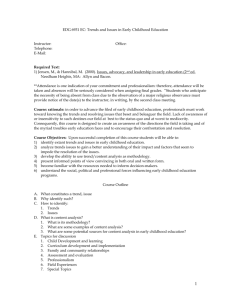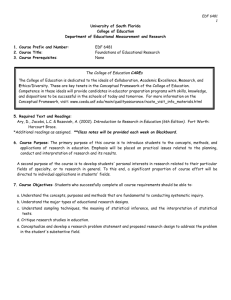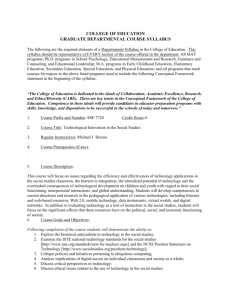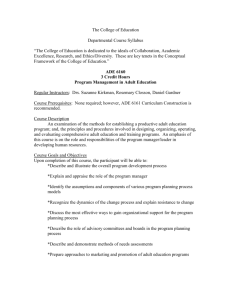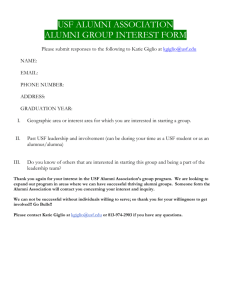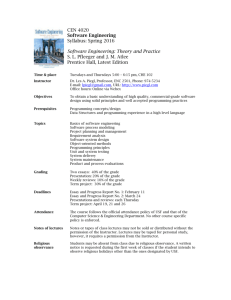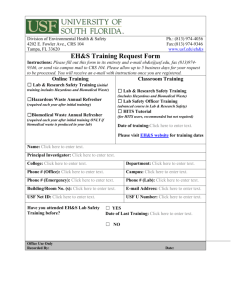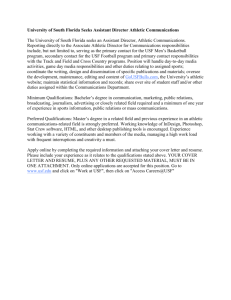The College of Education - University of South Florida
advertisement
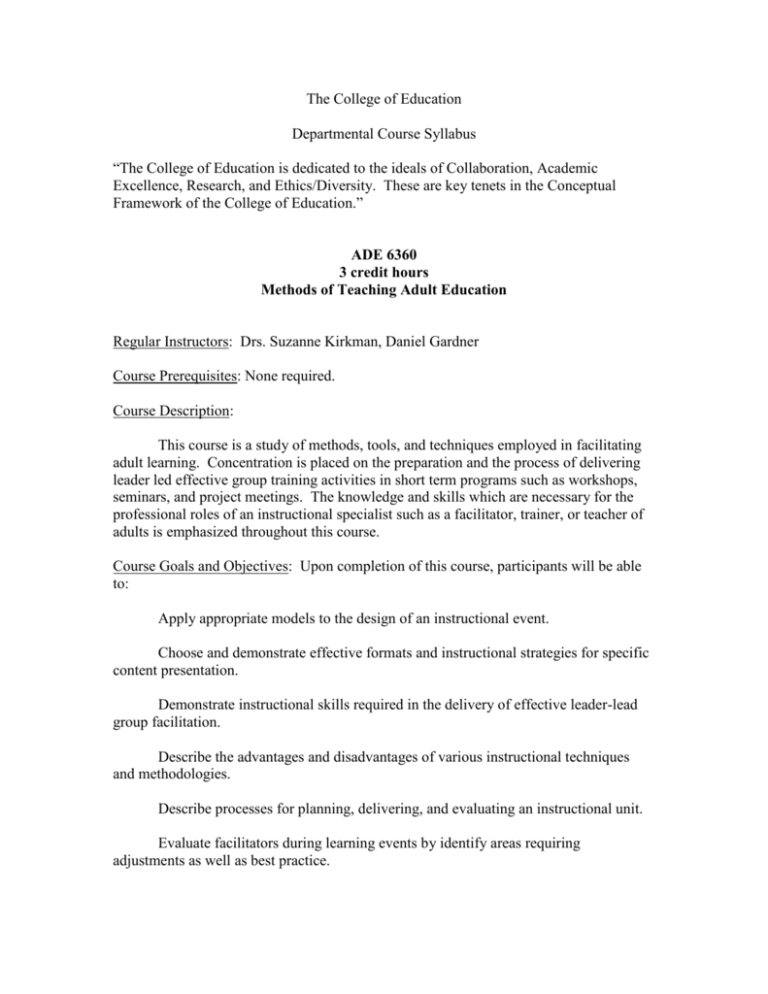
The College of Education Departmental Course Syllabus “The College of Education is dedicated to the ideals of Collaboration, Academic Excellence, Research, and Ethics/Diversity. These are key tenets in the Conceptual Framework of the College of Education.” ADE 6360 3 credit hours Methods of Teaching Adult Education Regular Instructors: Drs. Suzanne Kirkman, Daniel Gardner Course Prerequisites: None required. Course Description: This course is a study of methods, tools, and techniques employed in facilitating adult learning. Concentration is placed on the preparation and the process of delivering leader led effective group training activities in short term programs such as workshops, seminars, and project meetings. The knowledge and skills which are necessary for the professional roles of an instructional specialist such as a facilitator, trainer, or teacher of adults is emphasized throughout this course. Course Goals and Objectives: Upon completion of this course, participants will be able to: Apply appropriate models to the design of an instructional event. Choose and demonstrate effective formats and instructional strategies for specific content presentation. Demonstrate instructional skills required in the delivery of effective leader-lead group facilitation. Describe the advantages and disadvantages of various instructional techniques and methodologies. Describe processes for planning, delivering, and evaluating an instructional unit. Evaluate facilitators during learning events by identify areas requiring adjustments as well as best practice. Content Outline: Temporary Systems Model Facilitation Model Transfer of Learning Formats and Techniques Basic Presentation Tools Presentation Skills and Software Managing Participants Lecture and Discussion Case Studies, Self Study and Job Aids Consensus Building, Team Building and Nominal Group Techniques Behavior Modeling, Role Playing, Demonstration Games and Simulation, Group Problem Solving Mentorship, Job Rotation and Internship Computer-aided Learning Teleconferencing and Distance Learning Evaluation of learning units Student Expectations, Requirements and Assessment: Active Participation - 20% of final grade and includes: attendance, participation in learning activities, and contribution to discussions. Participants will be responsible for completing eleven in-class evaluations of other participants’ presentations according to guidelines presented to the participants including: Program Opening Clarification of objectives, process, agenda Identification of expectations Introductions Ice-breaker(s), if any Program Operation Sequence of activities Use of methods Involvement of participants Use of media Program Closing Transfer of learning Expectations Feedback Review of Literature – 25% of final grade Participants will write a review of literature on a course related topic in APA format. Process Observation – 15% of final grade Each class member will observe a workshop, seminar, class session, etc. and observe techniques and processes used to help participants learn. The results of this observation will be reported consistent with the following format. Nature of the Program Organization Purposes and/or objectives Target population Description of the Trainer, Leader, Teacher Background, preparation Similarity or differences in relation to the target population Program Planning Evidence of planning Facility considerations Pre-system communication Needs identification, if any Program Opening Clarification of objectives, process, agenda Identification of expectations Introductions Ice-breaker(s), if any Program Operation Sequence of activities Use of methods Involvement of participants Use of media Program Closing Transfer of learning Expectations Feedback The Process Observation Report will include the items listed above and a flowchart that depicts the overall sequence of activities. In addition, handouts may be attached. Train-the-Trainer Presentation – 35% of final grade This activity is a major portion of the final grade as it involves a 90 minute, leader lead, train-the-trainer presentation on an assigned course content topic. Additionally, a portfolio of presentation preparation, unit lesson plan, budget and feedback will be part of the assessment. Participants will be video-taped during this presentation. Final Quiz – 5 % of final grade Grading Procedures and Criteria “No grade below “C: will be accepted toward a graduate degree. This includes Cgrades.” Grading system and percentages to be used in this course are as follows: Grade A+ B+ C+ D+ F Percentage Grade A B C D+ 89-87 79-77 69-67 59- Percentage 93-100 86-83 76-73 66-63 Grade ABCD- Percentage 91-90 82-80 72-70 62-60 Grades of FF, I, IF, IU, MF, MU, N, S, U W, WC and Z described in the current catalog will be used. University GPA equivalents of the above grades are as follows: 4.00 A+ B+ C+ D+ F (Please note no additional grade points for A+ designation) 3.33 2.33 1.33 0 A 4.00 A- 3.67 B C D 3.00 2.00 1.00 BCD- 2.67 1.67 .67 Textbooks(s) TEXT - Required Silberman, M. (1998). Active training, A handbook of techniques, designs, case examples, and tips. San Francisco: Jossey-Bass, Inc. (ISBN: 0-7879-3989-7) TEXT - Recommended Galbraith, M. (2004). Adult learning methods, A guide for effective instruction. 3rd edition. Malabar, FL: Krieger Publishing Company. (ISBN: 1-57524-232-X) “ADA Statement: Students with disabilities are responsible for registering with the Office of Student Disabilities Services in order to receive special accommodations and services. Please notify the instructor during the first week of classes if a reasonable accommodation for a disability is needed for this course. A letter from the USF Disability Services Office must accompany this request. USF Policy of Religious Observances: Students who anticipate the necessity of being absent from class due to the observation of a major religious observance must provide notice of the date(s) to the instructor, in writing, by the second class meeting.” “Web Portal Information: Every newly enrolled USF student receives an official USF email account that ends with :mail.acomp.usf.edu.” Every official USF correspondence to students will be sent to that account. Students should go to the Academic Computing website (http://www.acomp.usf.edu) and select the link “Activating a Student E-mail account” for detailed information. Information about the USF Web Portal can be found at: Http://www.acomp.usf.edu/portal.html.” “Academic Dishonesty: Plagiarism is defined as “literary theft” and consists of the unattributed quotation of the exact words of a published text, or the unattributed quotation of the exact words of a published text, or the unattributed borrowing of original ideas by paraphrase from a published text. On written papers for which the student employs information gathered from books, articles, or oral sources, each direct quotation, as well as ideas and facts that are not generally known to the public at large must be attributed to its author by means of the appropriate citation procedure. Citations may be made in footnotes or within the body of the text. Plagiarism also consists of passing off as one’s own, segments or the total of another person’s work. Punishment for academic dishonesty will depend on the seriousness of the offense and may include receipt of an “F: with a numerical value of zero on the item submitted, and the “F: shall be used to determine the final course grade. It is the option of the instructor to assign the student a grade of F or FF (the latter indicating dishonesty) in the course.” “Detection of Plagiarism: The University of South Florida has an account with an automated plagiarism detection service which allows instructors to submit student assignments to be checked for plagiarism. I reserve the right to 1) request that assignments be submitted to me as electronic files and 2) electronically submit assignments to SafeAssignment.com, or 3) ask students to submit their assignments to Safe Assignment.com through my USF. Assignments are compared automatically with a database of journal articles, web articles, and previously submitted papers. The instructor receives a report showing exactly how a student’s paper was plagiarized. For more information about SafeAssignment and plagiarism, go to http://www.c21te.usf.edu and click on Plagiarism Resources. For information about plagiarism in USF’s undergraduate catalogue, go to: http://www.ugs.usf.edu/catalogs/0304/adadap.htm#plagiarism “ All quotations above come from the College of Education’s 2004 Departmental Course Syllabus: Graduate Level Courses publication or from the Guidelines for Syllabi from the University of South Florida’s College of Education web site http://www.coedu.usf.edu/main/downloads/syllabi_guide.html retrieved 10/20/2005.
